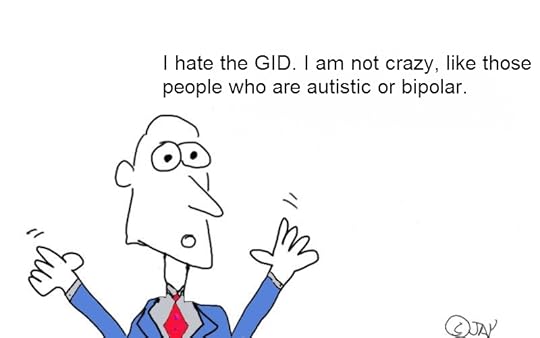The Real Reason Transsexuals Hate Gender Identity Disorder
The reason many transsexual and transgender people hate the DSM and GID?
We don’t want to be perceived as crazy.
When I started hormones in 1996, the psychological diagnosis of gender identity disorder used to enrage me. I didn’t have a psychological problem: “I’m not crazy!”
“There is nothing psychologically wrong with wanting to change my gender!”
I had a medical problem and believed my interests as a transsexual female to male would be best served by creating a medical diagnosis, i.e. an endocrine disorder, for example.
A medical diagnosis would surely be better than a psychological one. A medical diagnosis had little social and medical package, I thought.
I really feared the label being lumped together with people with autism or bipolar disorder.
A deep seated fear of Crazy worried its way into my psyche. I said things about transsexuality and the DSM and psychological disorders that now make me cringe.
God I was just a snotty, ableist jag off. Truly.
Now I know this fear is misguided.
Now I’ve learned a diagnosis is a diagnosis.
Whether the diagnosis is medical or psychiatric, I must still navigate through a system of channels and locks controlled by people who may or may not have my interests in their sights.
Now I’ve learned psychiatric treatments often center around making a person productive, which I think codes out as “go earn the system some profits,” or unitary or stable, whatever that means.
Psychiatric treatments seem to want to create cardboard facsimiles, not treat human beings.
I can relate. The questions and tests and interviews facilitated by the diagnosis of gender identity disorder often seem more about the clinicians than me, managing my therapist’s gender by offering responses I know they’ve wanted to hear.
Medical diagnosis don’t offer better solutions. People with diagnosis of cerebral palsy, for example, can, and are, treated like children by clinicians.
When I really listened to disability activists, sitting with my prejudices and discomforts, I realized a diagnosis is a diagnosis, and better to change the system.
I am solidarity with mental health activists, advocate for complete, low and no cost access to all necessary mental health treatments and believe in more varied work options that allow a person to work in environments conducive to managing their cognitive states. (Who among us as often wondered why those of us who can sit at office jobs, have to sit doing very little – facebooking and tweeting and gchatting -because we’ve finished our day’s work in 90 minutes? Why can’t the corporatists, who are supposed to be smarter than we are, just pay us a day’s wage for 90 minutes of our time?)
Now I’ve learned few circumstances exist that warrant denying a person hormones if they also have a second, psychological diagnosis.
A person’s gender dysphoria another mental health diagnosis can follow parallel paths and never intersect. Most therapists I’ve known misunderstand this phenomena, believing that gender can’t be independent of any other diagnosis.
Now I’ve learned the psychotherapeutic communities want control. They want to mold us into an image in which they see themselves. Whether or not we survive such extrusions, who cares? We get a stamp of “normal.”
And if you are a black man fighting against a system out to kill you, you’ll probably get diagnosed as schizophrenic.
Or maybe you’re a white woman fighting against the malaise of confined, middle-class womanhood.
Either way the cure – whether the diagnosis is schizophrenia or under stimulating – doesn’t address the problem, which is racism and misogyny.
I find it difficult to believe psychiatry a value-neutral proposition. Certainly it can be helpful. Pharma drugs can improve people’s lives, including mine.
Too often the unexamined response is fear and control.
When I worked at a social work school, a new coworker called me in a panic.
“A man is sitting in the common area, shouting and biting his fist.”
“He has Tourette’s syndrome,” I told her after walking past the man to her office.
“We know him,” I said.
She smiled, sort of.
“Oh. Okay.”
The social norming of my employer told her she needed to accept him. He had a right to sit in the common area and shout and bite his fist.
Her upbringing suggested a different outcome.
Middle-class people prize quiet and social conformity.
Crazy is a very bad thing among the middle class. Your head is broke.
Now I realize my head is broke, too, when examined through the lens of extreme middle class blandness, conformity and the DSM.
With my broken head and big mouth, I gladly speak in solidarity with other people living with a psychiatric diagnosis.
Whether a little bit or a lot, a broke head is still broken.




